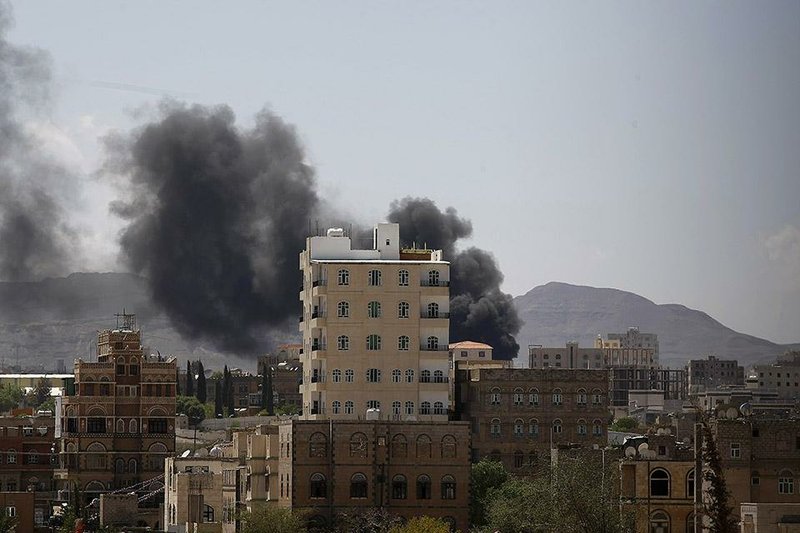SANA, Yemen -- An assault on Yemen's capital rocked the transitional government Sunday as fighters from a Shiite rebel group seized official buildings, and in the face of the violence, the military showed signs of splitting apart and the prime minister abruptly resigned.
Later Sunday, government officials and the rebels signed a peace agreement, state media said.
The rebels, known as the Hawthis and armed with automatic rifles and artillery mounted on trucks, battled security forces in the streets, with shells exploding around contested military facilities in the center of Sana, the capital. News reports said at least 140 had died in the past four days of fighting.
There were no official casualty figures from Sunday's violence.
The peace agreement calls for an immediate cease-fire and the formation of a technocratic government within a month after consultations with all political parties, a United Nations envoy to Yemen said later at a joint news conference with President Abed Rabbo Mansour Hadi.
"The head of the government may not belong to any political group," said Jamal Benomar, reading from the document that he said also calls for security forces to be restructured based on consultations with the political parties.
But a similarly vague peace agreement announced by Benomar on Saturday night did not last until dawn.
The Hawthis' swift advance through the capital is likely to exacerbate sectarian and political tensions in the region: Saudi Arabia and the other Sunni Muslim-led Persian Gulf states say that the Shiite rebels in Yemen are backed by Iran, a Shiite state.
Saudi Arabia previously sent troops to Bahrain to tamp down an uprising by its Shiite majority, and the Sunni Persian Gulf states are waging a fierce proxy fight against Iran through the conflict in Syria.
Yemen, one of the Arab world's poorest nations, is facing multiple challenges. In addition to the Hawthi rebels, an al-Qaida branch in the south poses a constant threat as it tries to impose control over cities and towns. U.S. officials consider al-Qaida in the Arabian Peninsula to be the terrorist network branch that most threatens the West.
The conflict began building weeks ago, when thousands of supporters of the Hawthis -- who are named for a powerful northern clan -- began staging protests and blocking roads to demand the reinstatement of fuel subsidies and a government shake-up. But by Thursday, the protests had escalated into sporadic fighting in the capital. Hadi has denounced the Hawthi attacks as an attempted coup.
On Saturday, the Hawthis seized the state television building, a central symbol of the government's power. State news media reported Saturday night that military units were moving to recapture it, but instead the Hawthis appear to have willingly turned over the site to the military police, a force that is regarded as independent of the government and perhaps sympathetic to the rebels.
By Sunday, certain military units, including the 4th Brigade and a military leadership center, had appeared to shift their support to the Hawthis instead of the government, perhaps switching loyalties to back the winning side.
Other reports Sunday said the rebels also were in control of the central bank and a university in the capital -- the latter significant because the university had been considered a redoubt of Sunni Muslim hard-liners.
As darkness fell, the Hawthis and their military allies had control of the state radio building and the prime minister's office.
But Hawthi forces continued to battle other military units, including the headquarters of the army's 1st Armored Division, an elite outfit led by Maj. Gen. Ali Mohsen al-Ahmar, who has led several military campaigns against the Hawthis in the north. The general's whereabouts was unknown.
A security official who spoke on the condition of anonymity said the Hawthis were also surrounding the Interior Ministry.
Interior Minister Hussein al-Terb issued a statement Sunday calling on police officers in the capital to "cooperate" with the Hawthis in maintaining security, a move seen as an attempt to stop the city from descending into lawlessness. The statement said the ministry considered the Hawthis "friends of the police in the service of the general interest of the homeland."
On Sunday afternoon, the official SABA news agency announced the resignation of Prime Minister Mohammed Salem Bassindwa but gave no details. A subsequent report by the agency quoted the president's office as saying it had not received any such request. The resignation officially has to be accepted by the president.
Bassindwa took office shortly after former President Ali Abdullah Saleh was forced to step down. He has been in office since February 2012 and has been criticized for his inability to deal with the country's problems.
"I have decided to tender my resignation from the government out of my concern to pave the way for any agreement reached between the brother leaders of Ansarullah" -- the party of the Hawthis -- "and brother [Abed Rabbo] Mansour Hadi, the president of the republic," the prime minister wrote in a letter of resignation.
Hawthi news outlets, meanwhile, published a version of the letter in which the prime minister accused Hadi of corruption. Its authenticity could not be confirmed.
Information for this article was contributed by Shuaib Almosawa and David D. Kirkpatrick of The New York Times; by Ahmed al-Haj and Merrit Kennedy of The Associated Press; and by Laura King and Amro Hassan of the Los Angeles Times.
A Section on 09/22/2014
